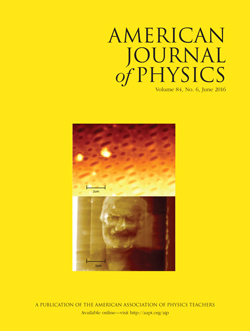June 2016 Issue, Volume 84, No. 6
This month's cover image is from the featured paper, A homemade atomic force microscope based on a quartz tuning fork for undergraduate instruction by Yingzi Li, Liwen Zhang, Guanqiao Shan, Zihang Song, Rui Yang, Hua Li, and Jianqiang Qian. DOI: 10.1119/10.1119/1.4941929
Atomic force microscopes are a key tool in nanotechnology that overcome the limitations of optical microscopes and provide imaging capabilities with nanoscale resolution. We have developed an atomic force microscope that uses an inexpensive quartz tuning fork as a micro cantilever. Because of its ease of operation and its open structure, it can be easily customized by students. Due to its low costs, it is possible that every student in the course has access to one setup, allowing all students to obtain deep insights into nanotechnology and to understand the principles of atomic force microscopy.
Papers
Not all counterclockwise thermodynamic cycles are refrigerators by R. H. Dickerson and J. Mottmann. DOI: 10.1119/1.4945266
A relativistic trolley paradox by Vadim N. Matvejev, Oleg V. Matvejev and Ø. Grøn DOI: /10.1119/1.4942168
Numerical matrix method for quantum periodic potentials by Felipe Le Vot, Juan J. Meléndez and Santos B. Yuste. DOI: 10.1119/1.4944706
Time-dependent perturbation theory in quantum mechanics and the renormalization group by J. K. Bhattacharjee and D. S. Ray. DOI: /10.1119/1.4944701
The principle of relativity and the de Broglie relation byJulio Güémez, Manuel Fiolhais and Luis A. Fernández. DOI: 10.1119/1.4941569
Ghostly action at a distance: A non-technical explanation of the Bell inequality by Mark G. Alford. DOI:10.1119/1.4945408
PHYSICS EDUCATION RESEARCH
Applicability of the Newtonian gravity concept inventory to introductory college physics classes by Kathryn Williamson, Edward E. Prather and Shannon Willoughby. DOI: 10.1119/1.4945347
COMPUTATIONAL PHYSICS
Simulating synchronization in neuronal networks by Christian G. Fink. DOI: 10.1119/1.4945009
NOTES AND DISCUSSIONS
Regions of attraction between like-charged conducting spheres by John Lekner. DOI: 10.1119/1.4942449
APPARATUS AND DEMONSTRATION NOTES
A simple demonstration when studying the equivalence principle by Valery Mayer and Ekaterina Varaksina. DOI: 10.1119/1.4945606


